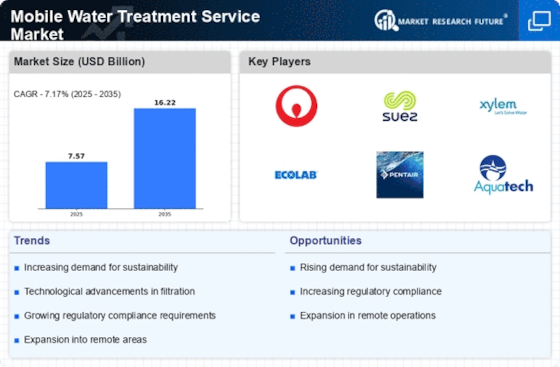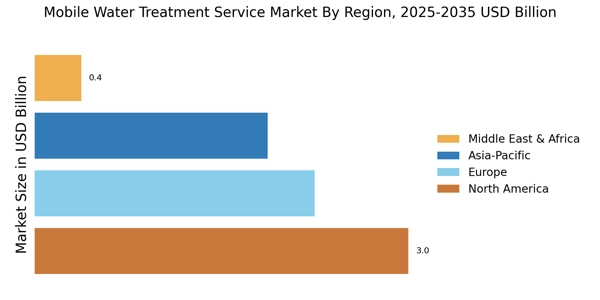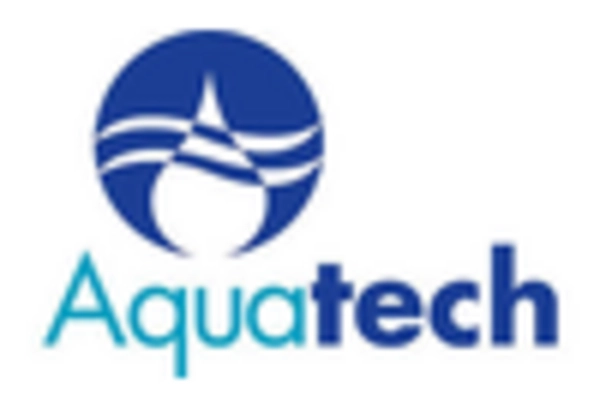Rising Water Scarcity
The increasing prevalence of water scarcity is a critical driver for the Mobile Water Treatment Service Market. As populations grow and industrial activities expand, the demand for clean water intensifies. Reports indicate that by 2025, nearly 1.8 billion people will live in areas with absolute water scarcity, necessitating innovative solutions. Mobile water treatment services offer a flexible and efficient means to address this challenge, providing immediate access to potable water in remote or underserved regions. This trend is likely to propel the market forward, as municipalities and industries seek to implement sustainable water management practices. The ability to deploy mobile units quickly in response to emergencies or natural disasters further enhances their appeal, suggesting a robust growth trajectory for the industry.
Environmental Regulations
Stringent environmental regulations are increasingly influencing the Mobile Water Treatment Service Market. Governments and regulatory bodies are implementing stricter guidelines to ensure water quality and protect ecosystems. Compliance with these regulations often necessitates the use of advanced water treatment technologies, which mobile services can provide. The market is likely to benefit from this trend, as companies seek to avoid penalties and enhance their sustainability profiles. For instance, industries that discharge wastewater are required to treat it to specific standards before release. Mobile water treatment services offer a practical solution for meeting these requirements, particularly in areas where permanent infrastructure is not feasible. As environmental awareness grows, the demand for compliant and efficient water treatment solutions is expected to rise, further propelling the market.
Technological Innovations
Technological advancements play a pivotal role in shaping the Mobile Water Treatment Service Market. Innovations such as advanced filtration systems, real-time monitoring, and automated treatment processes enhance the efficiency and effectiveness of mobile units. For instance, the integration of IoT technology allows for remote monitoring and management of water quality, ensuring compliance with health standards. The market is projected to witness a compound annual growth rate of approximately 10% over the next few years, driven by these technological improvements. Furthermore, the development of eco-friendly treatment methods, such as solar-powered systems, aligns with the growing emphasis on sustainability, potentially attracting a broader customer base. As technology continues to evolve, it is likely to create new opportunities for service providers in this dynamic market.
Increased Industrial Applications
The expansion of industrial applications is a significant driver for the Mobile Water Treatment Service Market. Industries such as oil and gas, mining, and food processing require reliable water treatment solutions to meet operational demands and regulatory requirements. The market for mobile water treatment services is expected to grow as industries seek to minimize downtime and enhance operational efficiency. For example, the oil and gas sector often operates in remote locations where access to clean water is limited. Mobile units can be deployed to treat water on-site, reducing transportation costs and ensuring compliance with environmental regulations. This trend indicates a growing reliance on mobile solutions, suggesting that the industry will continue to thrive as more sectors recognize the benefits of on-site water treatment.
Growing Awareness of Water Quality
The increasing awareness of water quality issues is a notable driver for the Mobile Water Treatment Service Market. Consumers and businesses alike are becoming more conscious of the importance of clean water for health and safety. This heightened awareness is leading to greater demand for reliable water treatment solutions, particularly in regions where water quality is compromised. The market is projected to expand as individuals and organizations seek to ensure access to safe drinking water. Mobile water treatment services provide a convenient and effective means to address these concerns, offering on-site solutions that can be tailored to specific needs. As public awareness continues to grow, it is likely that the demand for mobile services will increase, suggesting a positive outlook for the industry.

















